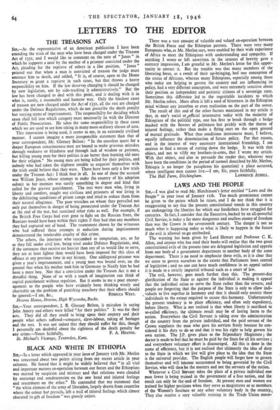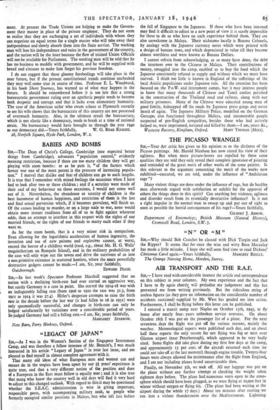LAWS AND THE PEOPLE
Sta,—I was glad to read Mr. Hutchinson's letter entitled "Laws and the People" in your issue of January nth. Too much prominence cannot be given to the points which he raises, and I do not think that it is exaggerating to say that the present constitutional trends in this country are endangering the liberties for which our forefathers have struggled for centuries. In fact, I consider that the Executive, backed by an all-powerful Civil Service, is today a far more dangerous and soulless enemy of freedom than was the Crown in the seventeenth century. The danger is not so much what is happening today as what is likely to happen in the future if the evil is allowed to go unchecked.
The warning has been given by Lord Hewart and Professor C. K. Allen, and anyone who has read their books will realise that the two great constitutional evils of the present time are delegated legislation and appeals from one body of a government department to another body of the same department. There is no need to emphasise these evils, as it is clear that we cease to govern ourselves to the extent that Parliament loses control of legislation ; and no one can have much confidence in an appeal unless it is made to a strictly impartial tribunal such as a court of law.
The evil, however, goes much further than this. The present-day glorification of the State as against the individual is making it appear that the individual exists to serve the State rather than the reverse, and people are forgetting that the purpose of the State is only to allow indi- viduals to live together in harmony and that it should only restrict these individuals to the extent required to secure this harmony. Unfortunately the present tendency is to place efficiency, and often only expediency, before liberty. What is not realised is that when liberty is sacrificed to so-called efficiency, the ultimate result may be of lasting harm to the nation. Everywhere the Civil Servant is taking over the administration of the country from the private individual, and the paid servant of the Crown supplants the man who gave his services freely because he con- sidered it his duty to do so and that it was his right to help govern his own nation. The J.P. gives place to the Stipendiary Magistrate ; the doctor is made to feel that he must be paid by the State for all his services ; and everywhere voluntary effort is discouraged. All this is done in the name of efficiency, but it is not realised that ultimately the idea of duty to the State in which we live will give place to the idea that the State is the universal provider. The English people will forget how to govern themselves and will become accustomed to being governed by the Civil Service, who will then be the masters and not the servants of the nation.
Whenever a Civil Servant takes the place of a private individual one man fewer is being trained in the government of a free nation, and the result can only be the end of freedom. At present men and women are trained for higher positions when they serve as magistrates or as members of the Women's Institute or any other voluntary body in the country., They also receive a very valuable training in the Trade Union move-
ment. At present the Trade Unions are helping to make the Govern- ment their master in place of the private employer. They do not seem to realise that they are exchanging a set of individuals with whom they can negotiate on equal terms for a single master who will take away their independence and slowly absorb them into the State service. The working man will lose his independence and voice in the government of the country, and the nation will be the loser because the flow of trained Union Officials will not be available for Parliament. The working man will be told that he has no business to meddle with government, and he will be supplied with bread and circuses to make him forget his previous freedom.
I do not suggest that these gloomy forebodings will take place in the near future, but if the present constitutional trends continue unchecked they may well come true in course of time. Professor E. L. Woodward, in his book Short Journey, has warned us of what may happen in the future. It should be remembered before it is too late that a strong bureaucratic government ruling over an apathetic people tends to become both despotic and corrupt and that it lacks even elementary humanity. The case of the American sailor who swam ashore at Plymouth recently to see his wife shows that the bureaucrats of this country are not possessed of overmuch humanity. Also, in the ultimate result the bureaucracy, which is not elastic like a democracy, tends to break at a time of national strain. No bureaucracy would have brought us through the year 1940 as our democracy did.—Yours faithfully, W. G. ROAD KNIGHT. 28, Norfolk Square, Hyde Park, London, W. 2.



























 Previous page
Previous page